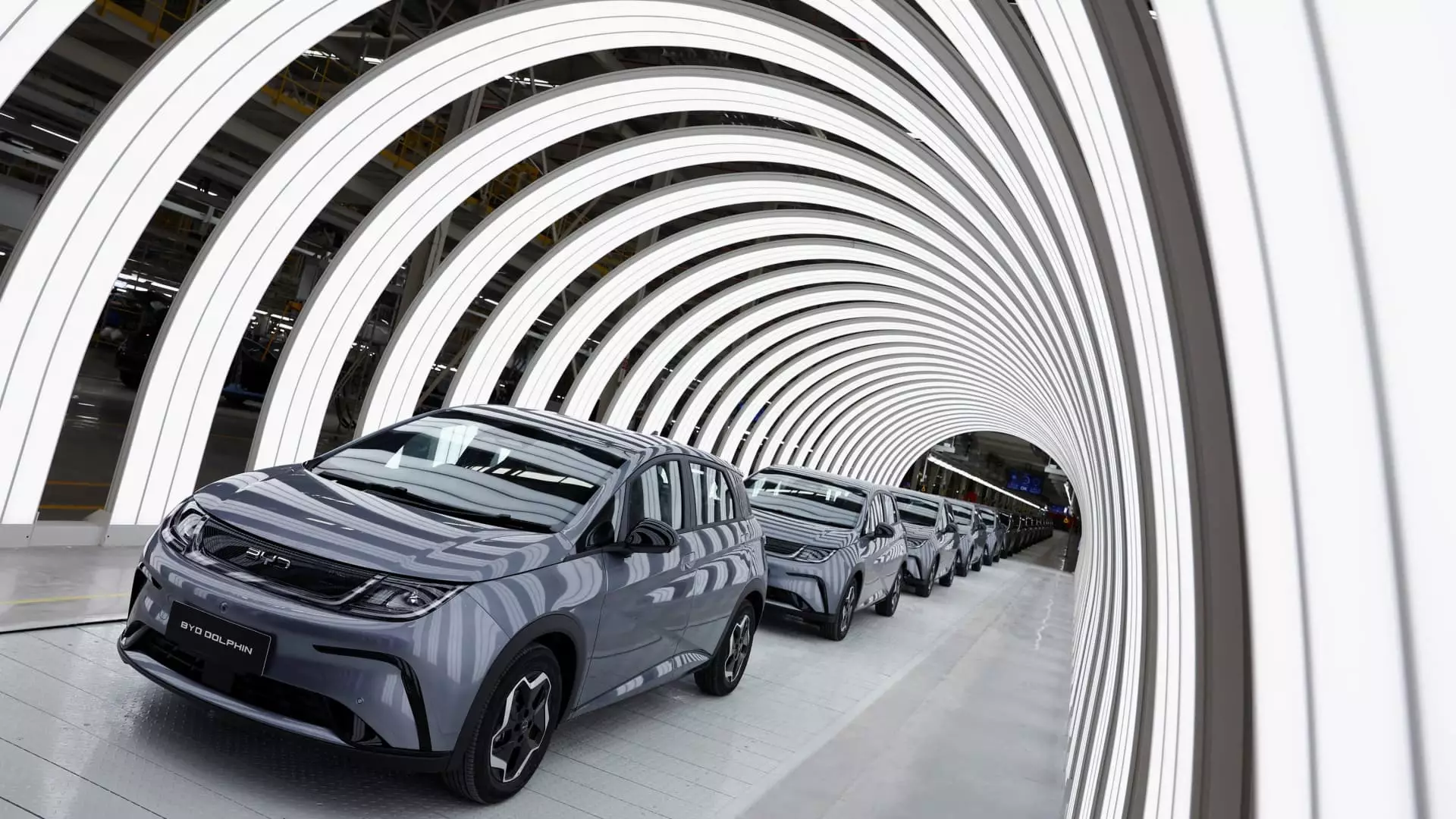In recent weeks, BYD, an electric vehicle manufacturer based in China, has made significant strides in the automotive industry by launching an innovative driver-assistance system that is already reshaping the market dynamics. With the integration of advanced technology into its vehicles, BYD targets a broader audience, including consumers looking for budget-friendly options. The company’s low-cost model priced below 70,000 yuan (approximately $9,600) exemplifies its commitment to democratizing access to cutting-edge automotive capabilities. As the automotive landscape heats up, particularly in China where competition is fierce, BYD’s aggressive entry into driver-assistance technology is expected to have a ripple effect on suppliers and the industry as a whole.
The launch of BYD’s driver-assistance system has already translated into tangible success for the manufacturer, with shares listed on the Hong Kong stock exchange hitting an all-time high. Analysts from Nomura have highlighted the resulting opportunities for suppliers that contribute parts for BYD’s driver-assistance system, projecting a favorable economic outlook for these companies. This growing demand stems from the increasing pressure on all automakers to enhance their smart driving capabilities to stay relevant. As such, it can be anticipated that there will be an uptick in the demand for components associated with driver-assist systems across the entire automotive sector.
Subsequently, firms like BYD Electronics, Horizon Robotics, and Hesai Technology are positioned to benefit significantly from this surge. BYD Electronics, affiliated with BYD, specializes in manufacturing key components for autonomous driving systems. Horizon Robotics, noted for its innovative chip technology, is anticipated to see a substantial increase in revenue as demand for smart driving technology continues to rise. Additionally, Hesai, based in the U.S., also contributes to this burgeoning space by providing lidar technology that enhances the efficacy of these driver-assist systems.
As the Chinese market witnesses a paradigm shift driven by the innovation introduced by local players like BYD, global giants such as Tesla are feeling the heat. Recently, Tesla’s stock took a hit following BYD’s announcement about its new driver-assistance system, sending a clear message that competition in the EV sector is intensifying. Tesla’s Full Self-Driving capability, which has not yet received regulatory approval in China, further highlights the challenges that legacy companies face in keeping pace with proactive and adaptable rivals like BYD.
To remain relevant, companies like Tesla must reevaluate their strategies in developing competitive smart driving functionalities. BYD’s laser focus on enhancing driver-assistance technology indicates a trend that could upend the automotive market. With these advancements being primarily aimed at the domestic market, the potential for a new industry standard being set by BYD is becoming increasingly evident.
As demand for driver-assistance technology rises, key players such as Horizon Robotics are experiencing a significant boost in their stock valuations. Recently, Goldman Sachs upgraded its assessment of Horizon Robotics, raising its price target in anticipation of a successful roll-out of its new Journey 6 chipset series, which is expected to become a cornerstone of smart driving solutions in lower-priced vehicles. Analysts forecast that the Journey 6 series, which currently accounts for only 3% of revenue, could rise to represent 40% by 2027—a significant jump that underscores the importance of smart driving chip technology in the coming years.
Similarly, BYD Electronics is projected to see notable revenue growth due to the increasing integration of advanced driver-assistance systems in its car lineup. Analysts estimate that upward of 3 million BYD vehicles will feature these capabilities this year, which means the company is well poised for sustained financial gains.
The Road Ahead: Autonomous Driving Technology
BYD’s strategy reflects a broader industry trend towards the integration of technology that enhances user experience and vehicle safety through autonomous features. Its “Dipilot” system is designed to vary in complexity depending on the model price point, ensuring accessibility across its diverse product range. Furthermore, collaboration with firms such as Nvidia for chip technology and Hesai for lidar components showcases a commitment to blending affordability with cutting-edge technology.
As automakers globally grapple with the challenge of improving smart driving functionalities, BYD’s advances could set the pace for the entire sector. The merger of innovative technology with driver-assistance systems not only signifies an evolution in how we interact with vehicles but also fosters a more competitive automotive market poised for growth.
BYD’s aggressive ventures into the realm of driver-assistance systems symbolize a turning point in the electric vehicle space—one that emphasizes the critical role of technology in navigating the future of transportation. The impacts of these advancements will undoubtedly reverberate across the automotive industry, fostering a new era of smart driving solutions.

